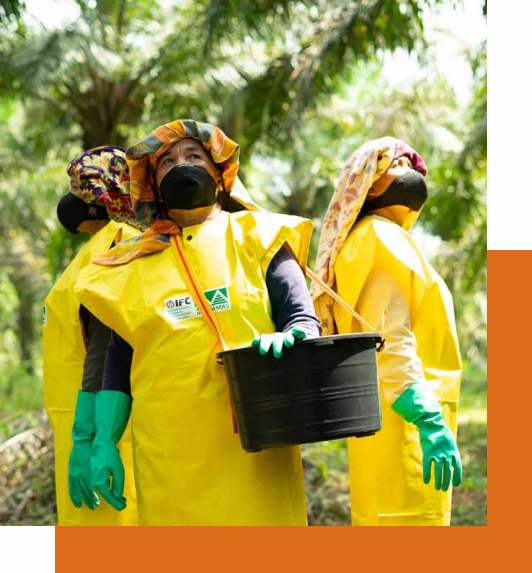The Musim Mas Group announced the completion of the first phase of its Women Smallholders Program to provide independent female smallholders with life skills. Developed with academic trainers from the University of North Sumatra (USU), the program offered voluntary training on health and nutrition to over 500 female smallholders and smallholders’ wives across three regencies of the Riau region in Indonesia. Musim Mas conducted the training in small batches across the region between March and October 2023, each batch lasting six weeks. The group aims to expand the program in 2024 to include financial literacy and entrepreneurship for home businesses. The group is also open to collaboration opportunities for the next phase of the program.
Musim Mas runs Indonesia’s most extensive independent smallholder training program. Since 2015, the group has trained over 42,900 independent smallholders in agronomy, sustainable production, and administration skills, among other skills. In 2020, Musim Mas expanded the program to include a train-the-trainers program for Village Extension Officers (VEOs). Musim Mas found from its experience that many smallholders in rural parts of Indonesia lacked adequate knowledge about healthcare and good nutrition. This prompted the group to include more life skills in its program. The group also found that women in rural parts of Indonesia typically manage their household’s meals and finances. Therefore, this new aspect of the program was targeted at women.
Based on data from the Indonesian Ministry of Health in 2018, over 10% of Indonesians live with diabetes, and over 34% suffer from hypertension. Initial assessments by the trainers found that most lacked knowledge of what constituted a balanced diet and had never had health screenings, even though most had access to them. Musim Mas conducted the training in three modules that covered family health, nutrition, toddler health, and personal hygiene. Graphic-intensive training booklets were developed to be easily understood. The group conducted the training in interactive and hands-on classroom sessions with posters, games, and discussions. Thereafter, participants were assessed and advised on a six-week health and diet plan with a voluntary review afterward to encourage a sustained behavioral change. Those who took part reported improved cholesterol, blood glucose, and blood pressure readings.
“Through our years of smallholder training, we saw first-hand that women in rural parts of Indonesia play a pivotal role in managing their family’s meals, health, and finances. After surveying the smallholders’ needs, we brought in experts to develop training on family nutrition, health, and financial literacy. Next, we’d like to expand the program to include financial literacy, and home-based bused entrepreneurship, with more partners on board.” Explained Linda Wati, Women Smallholders Program – Project Leader, Musim Mas.
Trainer Dr. Fotarisman Zaluchu, S.K.M., M.P.H, of the Social Anthropology department at USU, explained, “With their lack of knowledge on healthcare basics and even the terminology, we had to develop training matters that could be easily understood. We also made the course interactive with games and discussions to really understand their needs.”
“In rural parts of Indonesia, women decide on the family’s meals and influence their spouses and children’s behaviors. By inviting them and their spouses to participate and showing them how healthy food isn’t necessarily bland, we believe we have truly motivated them. We also created voluntary WhatsApp groups for them so that the participants can encourage each other, said the trainer, Dr. Putri C. Eyanoer, MS.Epi., Ph.D., a lecturer at the USU Faculty of Medicine.
Roslina Tampubolon, a smallholder from Rokan Hilir Regency, Riau, who took part, shared, “When I think about my child’s future, I want to be healthy for them. I changed my habits and started eating healthily. Now, when I wake up, I feel full of energy. I also share and invite family and friends to live a healthy life.”
Musim Mas has made “improving the lives of smallholders, workers, and communities” the first pillar of its sustainability policy. The Women Smallholder Program exemplifies the group’s commitment, and Musim Mas aims to strengthen the program further by including financial literacy and home-based entrepreneurship training. This program is also in line with the United Nations’ Sustainable Development Goals, particularly SDG2 (Zero Hunger), SDG5 (Gender Inequality), and SDG8 (Decent Work and Economic Growth).







